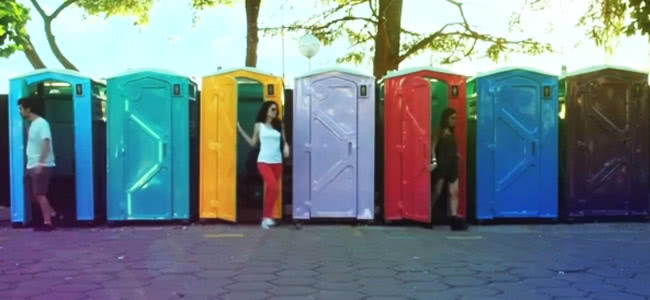We all dread the inevitable moment when nature calls at a music festival, burdening us to withstand long queues of foot-shifting, hopping up and down, ‘about to bust your jean button’ agony.
There is nothing pleasant about the portaloos either, with lingering aromas of other festival-goers before you, until now; but now an Argentian music festival actually gives a shit.
As Gizmodo reports, Personal Fest in Argentina has invented a wacky portaloo experience, by involving toilet breaks with a musical twist.
Personal Fest is an annual summer festival in Argentina, regularly drawing more than 50,000 attendees. Previous years have featured the likes of Bloc Party, The Offspring, New Order, and Feist.
The organisers of Personal Festi have created Rhythmical Potties, a bank of seven toilets that play music as soon as someone enters. This unique concept is created by wiring up the loos with lights and tunes that begin playing when someone occupies the stall. Each stall has its own unique music that brings your ‘quiet time’ to life.
Interestingly, if someone else enters a stall at the same time as you, the music synchronises like a DJ set and mashes the existing tracks together. The music will automatically start for each cubicle, so it layers with the other stalls currently in use.
Each stall has its own unique music that brings your ‘quiet time’ to life.Imagine all seven stalls being used at once, it creates quite a jam! At least no one can hear what you are doing in there. After you exit the musical loo, the music and lights stop, as well as synchronising with the other stalls.
Personal, a mobility company and the main sponsor of Personal Fest, has created a Youtube video (which you can view below) to promote the Rhythmical Potties at its music festival in Argentina.
It may seem like a zany idea, but its just another step towards evolving the music festival organisation to be more twenty-first-century friendly.
Similarly, at other European music events, fitted wristbands that contain an electronically fitted microchip, similar to the technology used in London’s Oyster card and Melbourne’s own Myki public transport systems, are becoming all the rage.
Festival-goers ‘swipe’ in and out of areas at the site by scanning their wristbands at turnstiles and handheld devices, enabling not only for the organisers to monitor the data, but are designed to cut down on ticket scalping and speeding up the inevitable queues; or as Intellitix, the company who put together the RFID tech put it, they provide “secure access control, social media integration, and cashless payment systems.”
Music streaming service Deezer has also developed an innovative approach to using this technology at music festivals. Using the contained information in an electronic microchip the clever little wristbands then create a personalised account of the users music festival activities, and can compile playlists according to what punters saw and enjoyed at the event.

































